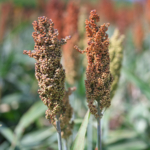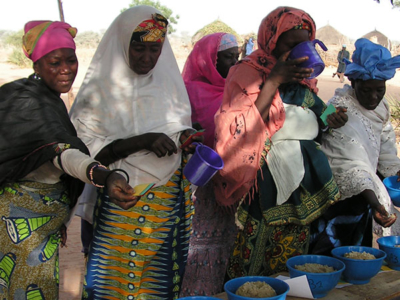


Burkina Faso, Mali, and Niger
See MapThe West Africa (WAf) CoP focuses on improving food security and nutrition for smallholder farming families in Burkina Faso, Mali, and Niger. The region has high human population growth rates, and the three countries rank among the world’s poorest.
As a result, millions of people are malnourished and food insecure. Food production in the region is handicapped by low soil fertility, highly erratic rainfall and inter-annual climate variability, and biotic crop production constraints such as the parasitic weed Striga, insect pests, and fungal diseases.
To cope more efficiently with these challenges, farmer organizations are growing in size and influence in the region.
The WAf CoP fosters agroecological transformation of sorghum- and pearl millet-based agricultural production systems. Strengthening farming systems demands continual attention to improved soil and water conservation and agronomic management; better crop varieties and seed distribution systems; integrated pest management; better systems (crop-tree-livestock) integration at plot, farm, and landscape levels; strengthened and diversified value chains; better diets and nutrition; and improved income and livelihoods for farming families.
The CoP strategy for achieving these ends involves promoting more systems-oriented research, diversifying partnerships, including farmer research networks, and using scenario modeling and other tools to determine how to break the poverty cycle. The CoP encourages projects to think creatively about diversity, equity, and inclusion, and to promote farmer-driven research and innovation. As part of this effort, the CoP increasingly supports farmer organizations that enable implementation of large numbers of on-farm trials with strong farmer participation. This can help speed adoption and local adaptation of technologies. The CoP also promotes mentoring from outside the region to facilitate the exchange of ideas and increase opportunities for regional capacity building, including leadership skills.
West Africa CoP Liaison Scientist
West Africa CoP Regional Representative
West Africa CoP Regional Representative

With high population growth, large proportions of rural populations, and high levels of malnutrition, including micronutrient deficiencies, Mali and the Sahel region in general rank among the lowest on the United Nations Human Development Index. Seed Systems in Mali is a long-term project now led by Baloua Nebie following Eva Weltzien-Rattunde’s retirement from ICRISAT in 2016. It focuses on various aspects of participatory breeding for improving sorghum- and millet-based systems in the Sahel region. The project has from its inception in 2006 worked with a network of large farmer organizations in all three West Africa CoP countries. The research network orientation taken by this project was seen as a promising approach for building capacities for expanding farmers’ seed systems. A key aspect was to expand farmers’ capacities in terms of increasing the crop and varietal diversity in their systems. A network of variety testers, seed producers, and seed marketing specialists was built within these farmer organizations to enhance the reach of the seed.